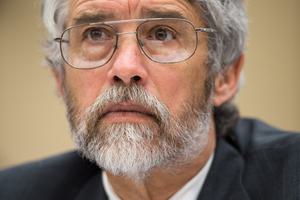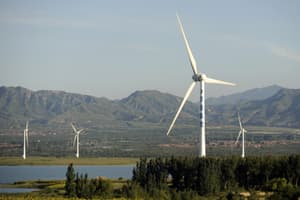In Policy
Environmental Law
-
Climate Politics
With Trump, China Emerges As Global Leader on Climate
-
A Post-Fact World
How the Attack on Science Is Becoming a Global Contagion
-
Deforestation
How Forest Loss Is Leading To a Rise in Human Disease
-
Energy Déjà Vu: Obama Must Break with Failed U.S. Policies
Despite soaring rhetoric and some promising proposals, President Obama is repeating the same mistakes that have doomed U.S. energy policy to failure for 40 years. Until Obama and Congress finally put a true price on the fossil fuels America consumes, the U.S. will continue its addiction to foreign oil and domestic coal.
-
One Year Later: Assessing the Lasting Impact of the Gulf Spill
On the anniversary of the Deepwater Horizon explosion, the worst fears about the long-term damage from the oil spill have not been realized. But the big challenge is more fundamental: repairing the harm from the dams, levees, and canals that are devastating the Mississippi Delta and the Louisiana coast.
-
Sustainable Palm Oil: Rainforest Savior or Fig Leaf?
The push to promote sustainable palm oil is turning into a test case for green consumerism. The outcome could help determine the future of the rainforests of Asia and Africa — and whether consumer pressure can really sway corporate giants.
-
China Takes First Steps In the Fight Against Acid Rain
Amid China’s seemingly boundless emissions of industrial pollutants, there are signs of hope. Discharges of sulfur dioxide, which causes acid rain, have actually decreased, offering some evidence that China is starting to establish a culture of pollution monitoring and control.
-
Climate Forecasts: The Case For Living with Uncertainty
As climate science advances, predictions about the extent of future warming and its effects are likely to become less — not more — precise. That may make it more difficult to convince the public of the reality of climate change, but it hardly diminishes the urgency of taking action.
-
Forging a Landmark Agreement To Save Canada’s Boreal Forest
Last spring, conservation groups and timber companies signed an historic agreement to protect a large swath of Canada’s boreal forest. In an interview with Yale Environment 360, the Pew Environment Group's Steven E. Kallick, a key player in the agreement, explains why the accord is integral to a larger plan to eventually preserve half of Canada’s extensive boreal forests.
-
In Wreckage of Climate Bill, Some Clues for Moving Forward
Ample blame exists for the demise of climate legislation in the U.S. Senate, from President Obama’s lack of political courage, to the environmental community’s overly ambitious strategy, to Republican intransigence. A way forward exists, however, to build on the rubble of the Senate’s failure to cap carbon emissions.
-
Enlisting Endangered Species As a Tool to Combat Warming
Environmentalists in the U.S. are increasingly trying to use the Endangered Species Act to ease the impact of global warming on numerous animals and plants, including the American pika. The goal is not only to protect the habitat of at-risk species but also to force reductions in greenhouse gas emissions.
-
A Grim Outlook for Emissions As Climate Talks Limp Forward
In the wake of the failed Copenhagen summit, prospects for cutting global CO2 emissions are worse than they’ve been in years. With talk of mandated cuts now fading and with countries exploiting loopholes, the world appears headed toward a flawed agreement based not on science but on politics.
-
Despite Rough Ride on Climate, Yvo de Boer Departs an Optimist
Even after the failure to reach agreement on binding CO2 cuts in Copenhagen last December, the United Nations’ outgoing chief climate negotiator is confident that the world is making progress on global warming. The key, he says, is convincing all nations, particularly developing ones, that tackling climate change is in their long-term economic interest.
-
Global Warming Deniers and Their Proven Strategy of Doubt
For years, free-market fundamentalists opposed to government regulation have sought to create doubt in the public’s mind about the dangers of smoking, acid rain, and ozone depletion. Now they have turned those same tactics on the issue of global warming and on climate scientists, with significant success.









